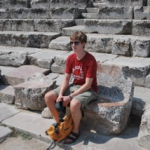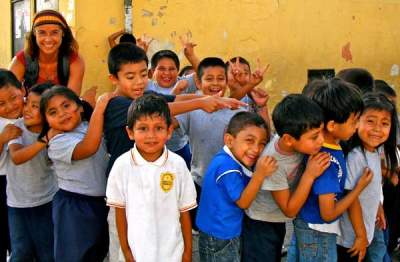For a UK volunteer in Ghana, there are a few words which need relearning. For example, when people say they’re "coming" in Ghanaian English, that usually means they’re going. When Ghanaian volunteers say "LA," they’re talking about the "local attractions"—that is, any local girls or guys of interest.
For me, after two weeks of a 12-week volunteering placement, it’s "GMT" that’s proving the hardest term to redefine. We Brits have left the GMT of our UK time zone and tuned in to "Ghana Man Time" (also known as "Ghana Maybe Time"). I’m not sure if this phrase was coined by UK volunteers or by Ghanaians, but they both use it whenever something is running late. You try to organize a meeting for 9:00 a.m. and it starts just after 10:00 a.m., that’s GMT. You’ve called a taxi, which arrives three hours late without letting you know? “Sorry, Ghana Man Time.” Obviously this goes for anyone, not just the Ghana man.
In Ghana I walk too fast, I eat too fast, and I find myself feeling impatient a lot of the time.
Like a lot of cultural differences, you get used to this quite soon, because everyone is running on GMT (at least where I am in the north). What I’m finding more difficult is the general slow down of life here, of which casual lateness is just a side effect. In Ghana I walk too fast, I eat too fast, and I find myself feeling impatient a lot of the time. I’m glad that the work I’m doing, at the local school, involves me getting up and going to a set place for a reasonably set time. But on weekends, it’s difficult to find kids to work with and days go by gradually under shady trees. For UK volunteers, time becomes how long it takes to drink a bag of water, or how long it takes a fan to turn back round to you.
If you’re looking to travel with purpose, the pace of life in other countries—particularly in hotter or less developed regions—can sometimes be frustrating. But, of course, there are upsides to slowing down. A searing Saturday afternoon swapping card games with a host family, or making paper planes with local kids lets you slip into the groove of the people you’re living with and lay the foundations for working with them. I’ve learned far more of the local language sitting on a bench under a tree than I have in school. So it’s good to clear some empty space—even if finding it hard to stand still was the reason you got on the plane.
Looking ahead—or trying to look ahead—at the rest of my three-month placement was pretty daunting at first. I wanted to go somewhere different and get as culturally immersed as possible in the space of one summer vacation, and obviously that’s easier said than done. Making a sustainable difference to girls’ education in a rural community in Ghana somehow isn’t as intimidating a challenge as just being in the unknown for this long. Any time things slow down and boredom sets in, panic follows. But maybe appreciating GMT and the unfamiliar spaces in between things here will be the key to long-term success.
Add this article to your reading list




